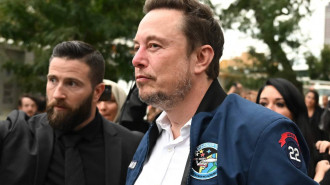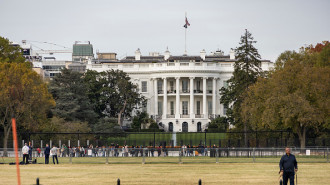WeWork founder: Me, MbS and Kushner 'would save the world'
The Israeli-born founder of failing co-working empire WeWork is alleged to have told his company that three people were going to save the world: Saudi Crown Prince Mohammed bin Salman, Jared Kushner, and himself, according to a searing exposé on the billionaire published in Vanity Fair.
Adam Neumann, the former director of the WeWork start-up - whom the article portrays as an "egomaniacal" millennial tycoon - is alleged to have had a fixation with the Saudi crown prince even after he was exposed as directly responsible for the torture, murder and dismemberment of journalist Jamal Khashoggi.
Neumann and bin Salman are thought to have had a close relationship, with the co-working tycoon allegedly telling his colleagues he was "saving the women of Saudi Arabia" by working with the crown prince to introduce coding courses for women.
Read more: Unanswered questions over Aramco IPO could undermine Saudi crown prince's vision
Moreover, Neumann is alleged to have told George W. Bush's former national security adviser Stephen Hadley, that if he had been MbS' mentor, he could have helped him navigate the fallout from Khashoggi's gruesome assassination in the Saudi consulate in Istanbul.
The article also sheds light on the Neumann's dealings with US presidential advisor and Trump's son-in-law Jared Kushner, whom he is said to have helped draw up his peace plan for the Middle East, dubbed the "deal of the century".
Neumann used his contacts to produce a hi-spec video for Kushner to present at the Bahrain summit in June, showing his vision of an economically transformed West Bank and Gaza.
Twitter Post
|
Kushner’s plan has so far been panned for only focusing on investment initiatives without regard for the long-running obstacles for a political solution.
A string of recent revelations on Neumann claim he "went through money like water", becoming increasingly delusional and absent while insisting on his giftedness he claimed could help solve the world’s most pressing issues.
The 40-year-old businessman reportedly met with world leaders, discussing the Syrian refugee crisis with Canadian leader Justin Trudeau and urban planning with London mayor Sadiq Khan.
In a previous exposé published in the Wall Street Journal in September, Neumann is claimed to have voiced aspirations such as living forever, expanding WeWork to Mars, and becoming "president of the world".
Saudi-backed SoftBank poured billions into failing empire
Further tying his collapsing empire to the Saudi regime, WeWork's main investor has been Japan's SoftBank group, which has pumped billions to bail out the rapidly expanding but profit-losing co-working start-up.
Nearly half of the money in the SoftBank's first Vision Fund comes from Saudi Arabia, which has pledged a further $45 billion for its second Vision Fund, which consist of $100 billion each.
According to Vanity Fair, Neumann's "most fervent believer" was SoftBank CEO Masayoshi "Masa" Son, who invested $10 billion in WeWork initially, before bailing it out for $9.5 billion in October.
The embattled start-up is taking extreme measures to reorganise amid mounting losses and a failed attempt to launch an initial public offering (IPO).
It announced on Thursday it will lay off 2,400 employees worldwide, after telling its shareholders earlier this month it had lost almost $1.3 billion in the third quarter, more than twice the losses recorded in the same period a year earlier.
Read more: Saudi-Israeli relations: The emergence of a new alliance
The painful lay-offs underscore the decline of what had previously been one of America's most celebrated startups that left a mammoth footprint in the commercial real estate of major world capitals.
As investors questioned the company's valuation of $47 billion, WeWork in September scrapped plans for its Wall Street debut, forcing out chief executive Adam Neumann.
Neumann stepped down from the company's board of directors with a $1.7 billion exit package while the company's value was slashed to $8 billion - a far cry from its initial sum at the start of this year and just a fraction of the sum envisioned as part of the failed IPO.





 Follow the Middle East's top stories in English at The New Arab on Google News
Follow the Middle East's top stories in English at The New Arab on Google News


